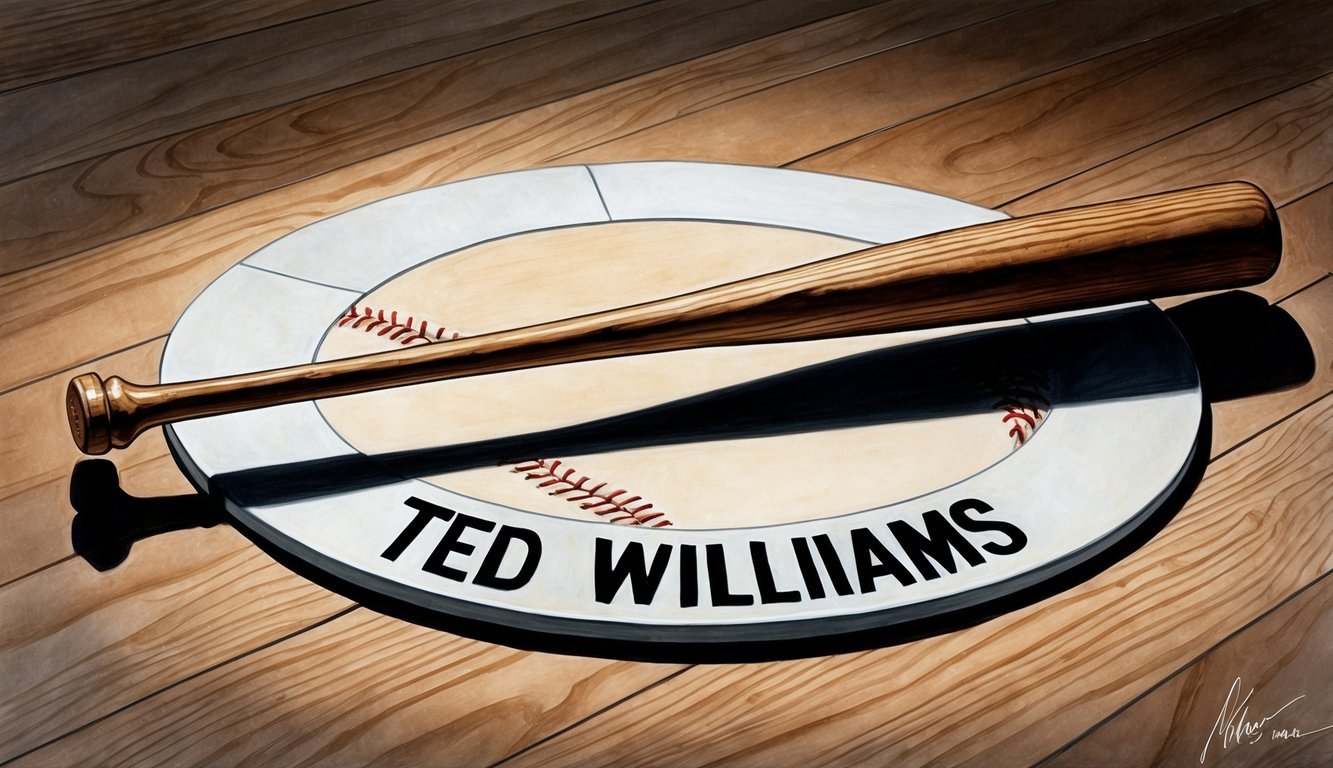Ted Williams, often called “The Greatest Hitter Who Ever Lived,” left an indelible mark on baseball history.
Born in 1918 in San Diego, California, Williams spent 19 seasons with the Boston Red Sox, cementing his legacy as one of the sport’s most remarkable players.
Williams achieved a remarkable .344 career batting average and hit 521 home runs, showcasing his exceptional skills at the plate. His most famous season came in 1941 when he batted .406, a feat no player has matched since.
Williams’ keen eye and disciplined approach to hitting earned him 2,021 walks over his career, demonstrating his patience and strategic mindset.
Despite missing several seasons due to military service, Williams’ impact on baseball remained profound.
He was elected to the Hall of Fame in 1966, recognizing his outstanding contributions to the sport.
Even after retirement, Williams stayed connected to baseball, managing the Washington Senators/Texas Rangers from 1969 to 1972.
Early Life and Background

Ted Williams emerged from humble beginnings in San Diego to become one of baseball’s greatest hitters.
His childhood experiences and early passion for the game shaped his future success.
San Diego Roots
Ted Williams was born on August 30, 1918, in San Diego, California.
His father, Samuel Stuart Williams, worked as a photographer and former sheriff.
His mother, May Venzor, devoted herself to the Salvation Army.
Growing up in a working-class neighborhood, young Ted found solace in baseball.
He spent countless hours practicing his swing, often using a broomstick as a makeshift bat.
San Diego’s mild climate allowed Williams to play baseball year-round, honing his skills on local sandlots.
Rise to Baseball
Williams’ talent quickly caught the eye of local scouts.
At just 17, he signed with the San Diego Padres, then part of the Pacific Coast League.
His impressive performance in the minor leagues drew attention from major league teams.
The Boston Red Sox soon acquired his contract.
In 1939, at age 20, Williams made his major league debut with the Red Sox.
His natural hitting ability and dedication to perfecting his craft set the stage for a legendary career.
Williams’ early years in professional baseball laid the foundation for his future success as one of the game’s most feared hitters.
A Storied Career with the Red Sox
Ted Williams dominated Major League Baseball for two decades, leaving an indelible mark on America’s pastime.
His remarkable achievements with the Boston Red Sox cemented his status as one of the greatest hitters of all time.
Breaking Records
Williams shattered numerous records during his 19-year career with the Red Sox.
In 1941, he achieved the remarkable feat of hitting .406, becoming the last player to bat over .400 in a season.
His keen eye and disciplined approach at the plate led to an astounding .482 on-base percentage, the highest in MLB history.
Williams won six AL batting titles and four home run crowns.
He claimed the Triple Crown twice, in 1942 and 1947, leading the league in batting average, home runs, and RBIs.
His career .344 batting average ranks among the highest in modern baseball history.
The Splendid Splinter’s Legacy
Known as “The Splendid Splinter,” Williams left an enduring legacy in baseball.
He slugged 521 home runs, placing him among the all-time greats.
His powerful left-handed swing and ability to hit for both average and power made him a feared presence in any lineup.
Williams’ impact extended beyond statistics.
He was a staunch advocate for player rights and helped pave the way for better conditions in the sport.
His dedication to perfecting his craft inspired generations of hitters who followed.
Teddy Ballgame’s All-Star Appearances
“Teddy Ballgame” was selected to the All-Star team an impressive 19 times.
He excelled on the Midsummer Classic stage, hitting .304 with four home runs in All-Star competition.
His most memorable moment came in the 1941 All-Star Game, when he hit a walk-off three-run homer in the bottom of the ninth inning.
Williams’ All-Star performances showcased his ability to shine against the best pitchers in baseball.
His consistent excellence earned him the admiration of fans and fellow players alike, solidifying his place among the game’s elite.
Military Service and Sacrifice
Ted Williams put his baseball career on hold twice to serve his country.
His military service during World War II and the Korean War showcased his dedication and bravery beyond the baseball diamond.
World War II Commitment
In 1942, at the height of his baseball career, Ted Williams enlisted in the U.S. Navy Reserve.
He trained as a naval aviator, earning his wings in 1944.
Despite never seeing combat during World War II, Williams spent three years away from baseball, serving as a flight instructor in Pensacola, Florida.
His commitment to service meant sacrificing prime years of his baseball career.
Williams returned to the Red Sox in 1946, picking up where he left off and winning the American League MVP award that year.
Service in the Korean War
In 1952, Williams was called back to active duty for the Korean War.
He flew 39 combat missions as a Marine Corps pilot, often as John Glenn’s wingman.
Williams faced dangerous situations, including a forced landing after his F9F Panther was hit by anti-aircraft fire.
His service in Korea earned him Air Medals and a promotion to captain.
Williams’ time in the military totaled nearly five years, significantly impacting his baseball statistics but earning him respect as both an athlete and a patriot.
Achievements and Recognition

Ted Williams’ extraordinary baseball career was marked by numerous accolades and honors that cemented his legacy as one of the greatest hitters in the sport’s history.
His exceptional skills and contributions to the game earned him widespread recognition both during and after his playing days.
Hall of Fame Inductions
Williams was inducted into the Baseball Hall of Fame in 1966, his first year of eligibility.
The honor recognized his outstanding 19-year career with the Boston Red Sox, during which he achieved a remarkable .344 lifetime batting average.
His enshrinement in Cooperstown solidified his place among baseball’s elite.
In addition to his baseball achievements, Williams’ passion for fishing led to his induction into the International Game Fish Association Hall of Fame in 2000.
This unique honor highlighted his expertise and contributions to the sport of fishing.
Award-Winning Skill
Williams’ batting prowess earned him numerous accolades throughout his career.
He won the American League MVP Award twice, in 1946 and 1949.
His most impressive feat came in 1942 when he captured the coveted Triple Crown, leading the league in batting average, home runs, and RBIs.
In 1941, Williams achieved one of baseball’s rarest milestones by hitting .406, becoming the last player to bat over .400 in a season.
This remarkable achievement stands as a testament to his unparalleled hitting ability.
After his retirement, Williams received the Presidential Medal of Freedom in 1991, the highest civilian honor in the United States.
This award recognized not only his baseball career but also his service as a fighter pilot in World War II and the Korean War.
Beyond the Plate

Ted Williams’ influence extended far beyond his baseball career.
He made significant contributions to literature, philanthropy, and outdoor sports.
Literary Contributions
Williams authored two influential books on baseball. “The Science of Hitting,” published in 1970, became a must-read for aspiring batters.
In this technical manual, he shared his insights on stance, swing mechanics, and pitch recognition.
His 1969 autobiography, “My Turn at Bat,” offered readers a glimpse into his personal life and baseball journey.
The book chronicled his rise to fame, wartime service, and baseball achievements.
Both works solidified Williams’ reputation as a keen analyst of the game.
They continue to be valuable resources for players and coaches today.
Charity and Advocacy
Williams was a passionate supporter of the Jimmy Fund, a charity dedicated to cancer care and research.
He used his fame to raise awareness and funds for the organization.
His involvement began in the 1940s and continued throughout his life.
Williams often visited young cancer patients, bringing joy and hope to their lives.
He also advocated for the inclusion of Negro League players in the Baseball Hall of Fame.
This effort helped recognize previously overlooked talents in baseball history.
Passion for Fishing
Fishing was Williams’ favorite pastime outside of baseball.
He particularly enjoyed fly fishing and spent much time in the Florida Keys pursuing this hobby.
After retiring from baseball, he became a consultant for Sears, promoting their fishing equipment line.
Williams’ expertise in the sport led to his induction into the International Game Fish Association Hall of Fame.
His love for fishing paralleled his approach to baseball – meticulous, passionate, and driven by a desire for excellence.
This pursuit provided Williams with a peaceful contrast to the pressures of professional sports.
Legacy and Impact on Baseball

Ted Williams left an indelible mark on America’s pastime, revolutionizing hitting techniques and inspiring generations of players.
His influence extended far beyond his playing days, shaping baseball’s future.
Influence on Future Generations
Williams’ scientific approach to hitting became a blueprint for players and coaches.
He emphasized pitch selection and proper mechanics, encouraging hitters to wait for their pitch.
His book “The Science of Hitting” remains a go-to resource for aspiring batters.
Many MLB stars, including Tony Gwynn and Wade Boggs, credit Williams’ teachings for their success.
His focus on getting on base influenced modern analytics, with OPS becoming a key metric.
Williams’ dedication to perfecting his craft set a new standard for professional athletes.
His tireless work ethic inspired countless players to push their limits.
Enduring Fame and Cultural Presence
“The Kid” remains one of baseball’s most iconic figures.
His larger-than-life persona and remarkable achievements keep him in the public eye decades after his retirement.
His legacy is not only defined by his on-field prowess but also by the impact he made off the diamond, inspiring countless young players to pursue their dreams.
Comparatively, the financial success of stars like Albert Pujols serves as a testament to the lucrative nature of the sport, with albert pujols career earnings reflecting the heights that talent and dedication can reach.
As fans continue to celebrate the legends of the game, “The Kid” remains a symbol of excellence and passion in baseball history.
Nicknames like “The Splendid Splinter” and “Teddy Ballgame” are still widely recognized.
Collectors highly prize memorabilia, from baseball cards to autographed bats, bearing Williams’ image.
The Ted Williams Museum and Hitters Hall of Fame in Florida celebrates his legacy.
Annual awards bearing his name honor top hitters in MLB, ensuring “The Thumper’s” enduring connection to the game.
